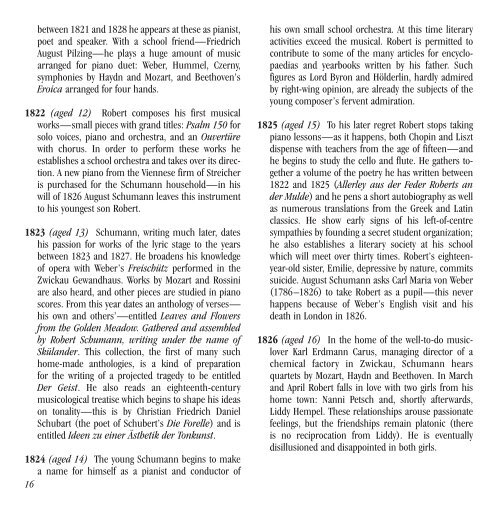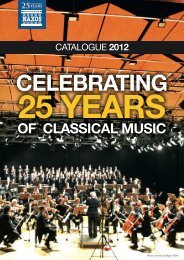Téléchargez le livret intégral en format PDF (application ... - Classique
Téléchargez le livret intégral en format PDF (application ... - Classique
Téléchargez le livret intégral en format PDF (application ... - Classique
Erfolgreiche ePaper selbst erstellen
Machen Sie aus Ihren PDF Publikationen ein blätterbares Flipbook mit unserer einzigartigen Google optimierten e-Paper Software.
etwe<strong>en</strong> 1821 and 1828 he appears at these as pianist,<br />
poet and speaker. With a school fri<strong>en</strong>d—Friedrich<br />
August Pilzing—he plays a huge amount of music<br />
arranged for piano duet: Weber, Hummel, Czerny,<br />
symphonies by Haydn and Mozart, and Beethov<strong>en</strong>’s<br />
Eroica arranged for four hands.<br />
1822 (aged 12) Robert composes his first musical<br />
works—small pieces with grand tit<strong>le</strong>s: Psalm 150 for<br />
solo voices, piano and orchestra, and an Ouvertüre<br />
with chorus. In order to perform these works he<br />
establishes a school orchestra and takes over its direction.<br />
A new piano from the Vi<strong>en</strong>nese firm of Streicher<br />
is purchased for the Schumann household—in his<br />
will of 1826 August Schumann <strong>le</strong>aves this instrum<strong>en</strong>t<br />
to his youngest son Robert.<br />
1823 (aged 13) Schumann, writing much later, dates<br />
his passion for works of the lyric stage to the years<br />
betwe<strong>en</strong> 1823 and 1827. He broad<strong>en</strong>s his know<strong>le</strong>dge<br />
of opera with Weber’s Freischütz performed in the<br />
Zwickau Gewandhaus. Works by Mozart and Rossini<br />
are also heard, and other pieces are studied in piano<br />
scores. From this year dates an anthology of verses—<br />
his own and others’—<strong>en</strong>tit<strong>le</strong>d Leaves and Flowers<br />
from the Gold<strong>en</strong> Meadow. Gathered and assemb<strong>le</strong>d<br />
by Robert Schumann, writing under the name of<br />
Skülander. This col<strong>le</strong>ction, the first of many such<br />
home-made anthologies, is a kind of preparation<br />
for the writing of a projected tragedy to be <strong>en</strong>tit<strong>le</strong>d<br />
Der Geist. He also reads an eighte<strong>en</strong>th-c<strong>en</strong>tury<br />
musicological treatise which begins to shape his ideas<br />
on tonality—this is by Christian Friedrich Daniel<br />
Schubart (the poet of Schubert’s Die Forel<strong>le</strong>) and is<br />
<strong>en</strong>tit<strong>le</strong>d Ide<strong>en</strong> zu einer Ästhetik der Tonkunst.<br />
1824 (aged 14) The young Schumann begins to make<br />
a name for himself as a pianist and conductor of<br />
16<br />
his own small school orchestra. At this time literary<br />
activities exceed the musical. Robert is permitted to<br />
contribute to some of the many artic<strong>le</strong>s for <strong>en</strong>cyclopaedias<br />
and yearbooks writt<strong>en</strong> by his father. Such<br />
figures as Lord Byron and Hölderlin, hardly admired<br />
by right-wing opinion, are already the subjects of the<br />
young composer’s ferv<strong>en</strong>t admiration.<br />
1825 (aged 15) To his later regret Robert stops taking<br />
piano <strong>le</strong>ssons—as it happ<strong>en</strong>s, both Chopin and Liszt<br />
disp<strong>en</strong>se with teachers from the age of fifte<strong>en</strong>—and<br />
he begins to study the cello and flute. He gathers together<br />
a volume of the poetry he has writt<strong>en</strong> betwe<strong>en</strong><br />
1822 and 1825 (Al<strong>le</strong>r<strong>le</strong>y aus der Feder Roberts an<br />
der Mulde) and he p<strong>en</strong>s a short autobiography as well<br />
as numerous translations from the Greek and Latin<br />
classics. He show early signs of his <strong>le</strong>ft-of-c<strong>en</strong>tre<br />
sympathies by founding a secret stud<strong>en</strong>t organization;<br />
he also establishes a literary society at his school<br />
which will meet over thirty times. Robert’s eighte<strong>en</strong>year-old<br />
sister, Emilie, depressive by nature, commits<br />
suicide. August Schumann asks Carl Maria von Weber<br />
(1786–1826) to take Robert as a pupil—this never<br />
happ<strong>en</strong>s because of Weber’s English visit and his<br />
death in London in 1826.<br />
1826 (aged 16) In the home of the well-to-do musiclover<br />
Karl Erdmann Carus, managing director of a<br />
chemical factory in Zwickau, Schumann hears<br />
quartets by Mozart, Haydn and Beethov<strong>en</strong>. In March<br />
and April Robert falls in love with two girls from his<br />
home town: Nanni Petsch and, shortly afterwards,<br />
Liddy Hempel. These relationships arouse passionate<br />
feelings, but the fri<strong>en</strong>dships remain platonic (there<br />
is no reciprocation from Liddy). He is ev<strong>en</strong>tually<br />
disillusioned and disappointed in both girls.



